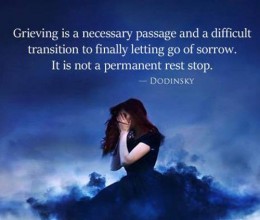I can't figure out why people seem to be upset when someone doesn't get over the
I can't figure out why people seem to be upset when someone doesn't get over their sadness.
I purposefully didn't say "can't get over their sadness" or "won't get over their sadness" or "don't want to get over their sadness" because I am not sure which it is that people don't do when they remain sad. If it's "won't", blame is implied. If it's "can't," a character flaw is implied, if it's "don't want to", it would seem as if it's a mental issue that's implied. Either way, why does another's inability to get over sadness seem to anger or upset or bother other people so much (if indeed, it does).Aren't some things simply too egregious to get over?

I believe it's common for people to want their loved ones to lead happy and productive lives. Watching someone languish or appear to "give up" saddens them and is often frustrating to watch.
Some may feel their loved one is not keeping things in perspective.
For example a couple has three children and one of them dies. Instead of being there for their two remaining children they opt to "check out" and ignore their needs. They're like "the walking dead".
"The woods are lovely, dark and deep,
But I have promises to keep,
And miles to go before I sleep,
And miles to go before I sleep."
- Robert Frost
Life is for the living!I love Frost's poem. Actually in 1964 (whoo 48 years ago?) my college Freshman English teacher had this student Stacey and I debate during the whole class about "Stopping By Woods on a Snowy Evening". She then explained the concept of universality.
It's one of my favorite poems as well. I can understand how one might be tempted to move towards the abyss of the lovely, dark, and deep woods in times of despair. However most of us have "promises to keep" and miles to go before we sleep.
Grieving too long can deplete all of the serotonin in the brain. It's a viscous cycle. If you have too little serotonin when you start grieving, you deplete your stores, then it's almost impossible to stop grieving.
Life Goes On
I would not get angry or upset that someone is too sad, I would just want to help. Grief is natural, but it can get out of hand. Sometimes people are unable to overcome their grief. It's a fine line, wanting to help and not wanting to interfere.
And sometimes one just doesn't know what to do or say to help. Life can be devastating to some.wow, I didn't know about serotonin levels and depletion. Thanks for your insight all the way around, Austinstar
Yes, I have been at the bottom of the depression well. I had to take serotonin for years to get over it. (anti-depressants). I am ok now. I still feel sad sometimes, but I am not catatonic anymore. I needed help & thankfully got it.
Austinstar, Thank you again for your mention of seretonin. I googled this up after your response and found an article on complicated grief that explains a lot! http://www.lovesicklove.com/2011/10/bre … grief.html Maybe others will benefit from reading it.
This question really hit home this morning. My daughter and her boyfriend broke up a few days ago and I'm trying anything I can do to cheer her up, I know it takes time. It's just really hard to see my daughter so sad, and it frustrates me that someone hurt her. On a different note, I have known a few people who seem to choose to be sad all the time, and after trying to help them over and over again it does get a bit annoying because just as happiness is contagious, so is sadness it seems.
Sunshyne, It's the worst to see your child in pain. Hopefully her time of sadness will be short. Someone once told me that a breakup is like up-rooting a tree; if the tree is young, the roots run shallow and it takes less time to fill the hole.
As has been mentioned here by more than one, it's fairly typical for those who love us to want us to be happy as opposed to sad. If there actually are "others who get upset when someone doesn't get over their sadness," IMHO they need to not concern themselves, for what is it to them?
Sadness is a feeling, a state of mind. It most often has a temporary cause and most human beings can get through this darkness in a relatively short period of time. With some effort and focus as well as compassionate support from those close to us, sadness eventually passes. Until the next time.
"Grief" on the other hand, becomes an actual part of us, gripping a strong hold on the very core of our being. Grief is much like a power that can overcome all other emotions and overwhelm & obscure our view of life itself.
Many many people exist day to day, going through all the motions as anyone does, often appearing perfectly content & productive~ yet hold within them an all-consuming grief as real and functioning as our heart beat & respiration. That degree of grief is more often than not only known by the person who grieves. This heaviness, which can also be described as an enormous void, is most difficult to be eradicated. It may be possible for particular individuals to emerge from this but not without extensive therapy, usually medication and on-going efforts.
In some rare cases, this type of insurmountable grief, literally remains forever until a person can say to herself, "I AM grief."~~& learn to exist as she must in order to survive until her life is over.
You may find this in a book, I'm not sure. Perhaps you could research textbooks by the score or consult with experts by the dozen. The easiest would be to simply believe me, because I am that person & I would not, could not lie to you of something so dreadful.Paula, my comment yesterday didn't get posted or I can't see it. What I said is that this is a stunning essay that should be published in and of itself. Thank you for sharing and I hope you share this with others. All warm wishes to you.
The APA a few years ago said that significant grief that lasted over 6 months was irrational and could be seen as a mental illness. By this standard, someone still in deep mourning a year after losing a spouse of 50 years needs counseling or medication. This is the medicalization of natural human emotions.
There's also a mistaken belief that grief goes through stages, and when you've gone through all five, life goes back to normal. And if you're still upset/crying/etc, something is seen as wrong, though it is natural.
If you lost someone early in your life, that loss is a hole in the fabric of your life - it doesn't fill, though you can plug in substitutes, some better than others. Society assumes that substitutes are sufficient, ignoring the emotional underpinnings of those needs and relationships. Kind of like "Here's your Big Brother, stop wishing your Dad was around!"
We in the West have also had death almost exclusively limited to old age, barring rare accidents and illnesses. Most of us now only see death at the end of life, after a long life. We don't see the tragedies of the 50% of kids that historically died in their first year, adults in prime killed in war or childbirth Those losses haunt us for life. In a society that sees death pretty much only at the end of life, we lose the ability to appreciate the sense of loss, because to the young, it appears inevitable, natural and a completion of life.Thanks Tamara for your thoughtful analysis of this question! I think your comment on a global perspective is very insightful and should cause us to think about the West and its often cavalier attitude toward loss in other cultures.
Related Discussions
- 4
How Do I submit a Hub for the Contest? I can't figure out how to tag my Hub as a
by MidwestJerseyGirl 12 years ago
How Do I submit a Hub for the Contest? I can't figure out how to tag my Hub as a Photo Gallery.
- 14
If you're a person who carries great sadness, how do you stop yourself from thin
by Billie Kelpin 8 years ago
If you're a person who carries great sadness, how do you stop yourself from thinking about it?What are strategies you use to cope with the sadness and regret of your life? Everyone experiences grief and some people can go past it. Keeping yourself busy with productive, meaningful work...
- 23
Can't write while grieving
by Cara 12 years ago
I lost a dear friend in a very tragic way. I haven't been on here for awhile and I can tell if I were to stay here now, read and comment my grieve will taint my words. I hope I can write again. Any grief tips would be helpful. I'm not in the greatest of moods so if you're thinking of...
- 20
Ever felt like you were meant for something great, but you can't figure out what
by Gianandrea Maoli 12 years ago
Ever felt like you were meant for something great, but you can't figure out what it is?
- 42
New Here - And Can't Figure Out Why Moderators Removed My Amazon Ads
by rcmandeville 8 years ago
Hi Everyone,I'm new to HubPages and I have a featured article that is over 1600 words. I joined the external Amazon Affiliate program, and then I featured three books written by other people, all of which directly related to the subject I was writing about. Within a few hours, all three Amazon...
- 2
Can't figure out where traffic is coming from...
by Glen Kowalski 9 years ago
I have one hub that is getting between 7-13 'hits' a day from google but I can't for the life of me figure out what the search terms used were. This is important to me since I'd like to know if they were finding what they were looking for or not. Analytics doesn't show any particular...











